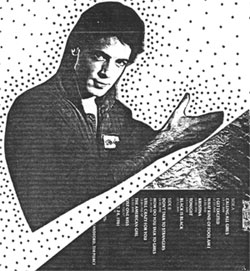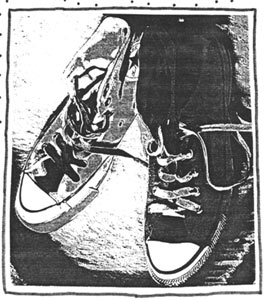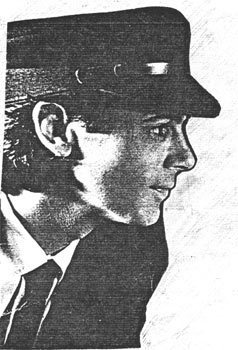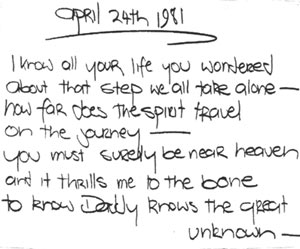Rick Springfield
Published on November 29th, 2008 in: Issues, Music, We Miss The Nineties |[This piece was originally published in Smack Dab Fanzine #4, September 1995. With the exception of typos I may have corrected, all of the original text and formatting remain the same. I have also scanned the original artwork.—Ed.]
Everyone whether they like it or not, remembers Rick Springfield. After all, he was a teen idol: musician, soap opera heartthrob and movie star.

But what do you REALLY know about him? I’m not talking about his birthday or favorite food. I’m talking about the real Springfield, the man with a troubled spirit, the man who has pondered the deepest, darkest themes of all time: the themes of love and passion.
Let’s take a peek into the soul of the man with a look at one of his most cherished pop sensations, the album Success Hasn’t Spoiled Me Yet.
The album begins with a frenzy in the song “Calling All Girls.” Here Rick uses the analogy of a strong male figure, in this case, a law enforcement officer, to show that he will wield his desire for women like a tool via his authoritative position as a cop:
I got a message
Put it through emergency
I wanna see it on the video tonight
Calling all girls (if you’re looking for love)
Calling all girls (if you’re looking for a hot time).
What is disturbing about this man’s raging sexual appetite is his desire for what appears to be teenage girls:
She was young, but she was ripe.

What’s more, he sees these young girls as evil, even carnivorous creatures:
She was vicious, and she took a bite.
—yet he still desires them.
Rick delves deeper into the universal Madonna/Whore complex in the next track, “I Get Excited.” Here he sees the struggle with the sexual urge as a battle of near-biblical proportions”
I think this angel’s about to sin
AND
I get excited
there’s Heaven in your eyes tonight
the fire’s ignited
down below it’s burning bright
He continues to implore his would-be lover to stay using this pair of images:
I can feel your heartbeat
can’t you feel the heat
baby’s got the cold feet
Here the rhyming of heat and feet provides brilliant contrast.

“What Kind of Fool Am I?” displays Rick’s obvious adoration for the Bard of Stratford-upon-Avon. Even the title shows that although Rick performs the part of the romantic hero, he also plays the jester, as evidenced by the word “fool.”
I thought we’d be together
Till the world ran down
Till the curtain fell
And the lights came on
Which clearly recalls:
All the world’s a stage
And all the men and women merely players
(Shakespeare: As You Like It, Act II, Scene VII)
The theatre analogy continues into “Still Crazy for You” in which Rick sings:
We thrived in shadows from scene to scene
His usage of the word “shadows” sets the tone for the song, which ponders the dichotomies of dark and light, blindness and sight, and most profoundly dreams and reality.
Lines like:
I fell into a parallax view
and
I didn’t see what I was doing
prove this, but the real thrust of the message occurs in the chorus:
My panorama’s dark
My sight’s been stripped away
Although Rick and his lover’s relationship was beautiful, it was a mere fantasy and now he has been left to the harsh reality of a life alone, a life bereft of vision and light, but perhaps most importantly, love.

Rick continues to wonder at the opposing forces of dark and light as well as the mystery of the goddess figure in “The American Girl”:
I wanna know if she’s talking ’bout me
Doing things her Daddy can’t see
The American Girl, out in the dark
She’s looking for love…
She’s such a mystery to me
Here the “girl” in question is clearly the daughter of Zeus (“Daddy”), Aphrodite, the goddess of love. She remains an enigma however, because she is never clearly named, she’s just “the American girl.”
The rest of this album is a rich tapestry of philosophies on many topics, particularly the themes of technological nightmare (“Kristina”—in which Rick becomes a motorcycle), the rise of the class system (“Tonight”—about the love between Patty and Jesse), the terrors of urban life (“Don’t Talk to Strangers”) and finally the mystery of the afterlife (“April 24, 1981″—where Rick addresses his dead father’s spirit.)
I could go on at length on these topics, but this is getting way too pedantic. I think I’ll go watch “Beavis and Butthead” instead.
One Response to “Rick Springfield”
December 11th, 2008 at 8:30 pm
Wow, is that really his handwriting? How lovely!
Still, really, the most significan creative endeavour of Springfield, for me, was portraying the original-flavor Nick Knight, vampire detective. Nothing can top that – not even “Jesse’s Girl”.
Time limit is exhausted. Please reload the CAPTCHA.